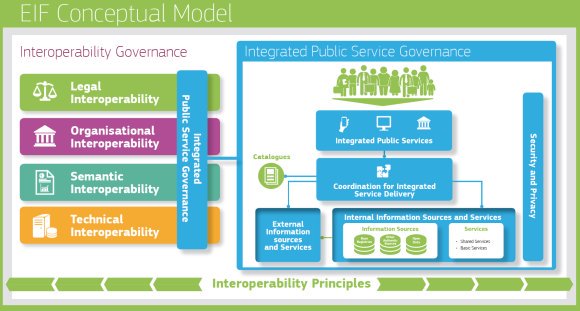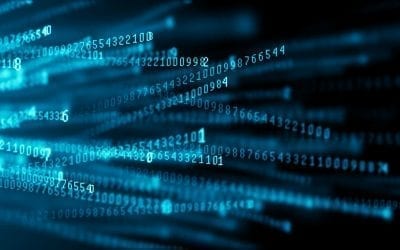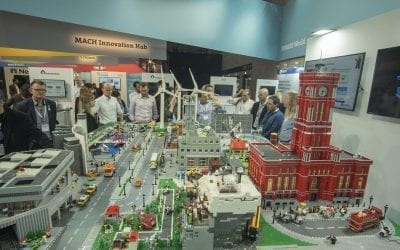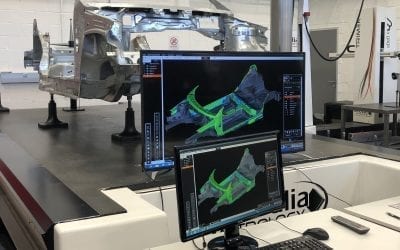In April last year, a Communication from the European Commission (EC) was published, incorporating a set of policy measures, aiming at the digital transformation of the Continent.
In May 2015, the EC presented its plans to create a Digital Single Market (DSM), a plan to tear down regulatory walls, supporting and linking efforts to unite the 28 national markets into a single and stronger one. A more agile and active, data-driven market, that eases the creation of new and innovative business. A transformation that will ensure a continuous and sustainable economic growth.
The Communication was the first industry-related initiative, part of the DSM strategy. Only two days later, at the Net Futures event, Commissioner Günther H. Oettinger addressed a message to country representatives and to the big companies, but also the SMEs and entrepreneurs, to the technology developers and the citizens committed with their own prosperity and welfare. To “all the Future Internet enthusiasts”, as he said.
Commissioner Oettinger stated that “Open platforms are fully in line with the Digital Single Market objective, and will act as a key driver for the Digitalisation of the European Industry”.
Certainly, FIWARE has been developing in line with the DSM objectives. And even now, after passing from the hands of the EC to the FIWARE Foundation, as the autonomous body within the community driving the global advancement of the technology and the expansion of the whole ecosystem, FIWARE maintains strong links to its origin and will keep playing a key role in the digitisation process that is revolutionising the European continent.
For instance, we have been working CEF Digital, a main EU programme supporting the establishment of trans-European digital infrastructures that contribute to the Digital Single Market. And, recently, the FIWARE Foundation were welcoming the Communication announcing the EC initiative on the free flow of data. FIWARE supports the principles laid out in the document, notably on minimising the lock-in effects and promoting the use of open APIs for reliable identification and exchange of data.
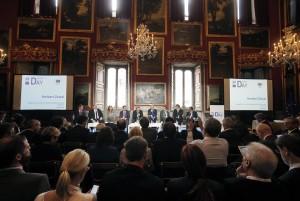 This year, March 23rd marked an important date in our calendar: part of the official celebrations of the 60th anniversary of the Treaties of Rome, the EU Digital Day event took place in Rome, looking at topics that will impact the near and long term future of EU citizens.
This year, March 23rd marked an important date in our calendar: part of the official celebrations of the 60th anniversary of the Treaties of Rome, the EU Digital Day event took place in Rome, looking at topics that will impact the near and long term future of EU citizens.
As Andrus Ansip, Vice-President for the Digital Single Market, presented it: “For over 60 years, European countries have worked together to capture the economic benefits of larger, better integrated markets, and made sure those benefits flowed to people. The same has to apply to the digital environment.”
Tomorrow –and today– digital highways will be the link between every person, every object and every place. “The Digital Day is about making sure that we make digital a truly positive power – in policies and laws, in our economy, society and in the lives of all Europeans” said Ansip.
From the FIWARE point of view, the highlights of the Digital Day included:
- A ministerial declaration to establish Europe as a global player in high-performance computing (HPC): Super computers involve thousands of processors working in parallel, capable of analysing great quantity of pieces of data in real time and simulating complex processes. Building the next generation of computing and data infrastructures, both in premises and in the Cloud, will offer Europe businesses and innovators –including 1.7 million researchers and 70 million science and technology professionals– a virtual environment to store, to share and re-use their data across sectors and borders.
Apart from the role that FIWARE technologies and the FIWARE Lab cloud infrastructure may play supporting this declaration, it is to be noted that MontBlanc European Exascale HPC computing project, focusing on embedded power-efficient technology, is coordinated by Bull. Bull is the brand for tech products & software made by Atos, founder member of the FIWARE Foundation. MontBlanc is now going through its 3rd phase of development, which started in Oct 2015. - Cooperation on connected and automated mobility: A letter of intent has been signed, to establish a legal framework for cross-border trials in connected driving, based on harmonised rules on data access, liability and connectivity. This drives forward EU plans announced in the Commission’s strategy to build a European Data Economy of January 2017 and in the EU strategy on cooperative, connected and automated mobility of November 2016.
FIWARE have been working on the development of technical resources that will support such efforts – facilitating connectivity through standard open APIs and harmonised data models, and offering a technological basis for an Economy of Data that would make financially possible the aforementioned hyper-connected vision.
On top of that, projects focusing on connected and automated mobility may get funded and supported by the powered by FIWARE acceleration programmes: IMPACT Growth and smart cities/mobility-centered frontierCities2. 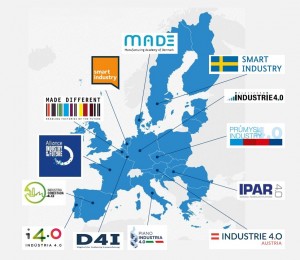 European platform on digitising industry to connect national initiatives: One year ago, the Commission presented a strategy to ensure that every business in Europe can fully benefit from digital innovation to upgrade its products, improve its processes and adapt its business models to the digital change. Launched by Commissioner Oettinger and Italian Minister for Economic Development Carlo Calenda, the European platform aims to generate joint investments, cooperation across borders and industry sectors and learning from each other as no single actor can do alone.
European platform on digitising industry to connect national initiatives: One year ago, the Commission presented a strategy to ensure that every business in Europe can fully benefit from digital innovation to upgrade its products, improve its processes and adapt its business models to the digital change. Launched by Commissioner Oettinger and Italian Minister for Economic Development Carlo Calenda, the European platform aims to generate joint investments, cooperation across borders and industry sectors and learning from each other as no single actor can do alone.
The FIWARE Foundation has marked the smart industry as one of the main directions to go forward, towards the global advancement of the platform. Industry 4.0, Industrial IoT and the emergent European Industrial Data Space would be three pillars of this vision. Over the next five years, Member States, the EU and industry are planning combined investments of more than €50 billion in support of digitising the European industry. By supporting this new platform, the FIWARE ecosystem will be easing the access to help pool resources and co-investments to ensure European companies are at the cutting edge of more profitable and sustainable, cleaner technologies.- Digital opportunities initiative: To match today’s needs around digital skills for businesses, mostly for small and medium-sized entreprises, the social partners, companies, education institutions and civil society need to take initiative and join forces. The Commission plans to launch a pilot project to provide cross-border work experiences. The aim is to test the interest of students and companies towards paid internships that will be available for students in more specialised fields like cybersecurity, big data, quantum technology or artificial intelligence, as well as in more general areas like web design, digital marketing, and software development.
FIWARE has always been identified as a positive force for job creating. That has achieved through the first Acceleration Programme, and is now reinforced by initiatives like the FIWARE Zone, with the specific aim to connect the University and the entrepreneurial world, with the Open Source technology and digital capacitation as a the link between them. - Updated framework for digital public services: Furthermore, the Commission presented an update on the European Interoperability Framework. This Framework was the last initiative to be announced as part of the Digital Single Market strategy.
On his keynote speech at the Closing Plenary session of Net Futures 2016, Commissioner Oettinger pointed at FIWARE as a key tool to achieve a true interoperability of public services. That is being tested primarily on the smart city domain, where FIWARE is succeeding on gaining a status as de-facto standard for interoperability, portability and avoiding vendor lock-in for digital solutions and services.
The new framework will ensure that all Member States’ administrations can follow a similar approach, making their public services available online and deal with security and data protection rules. By making them interoperable, the institutions make sure that their digital services are accessible across borders and policy areas, making it easier for people and businesses to communicate with their administration and those of other Member States.

